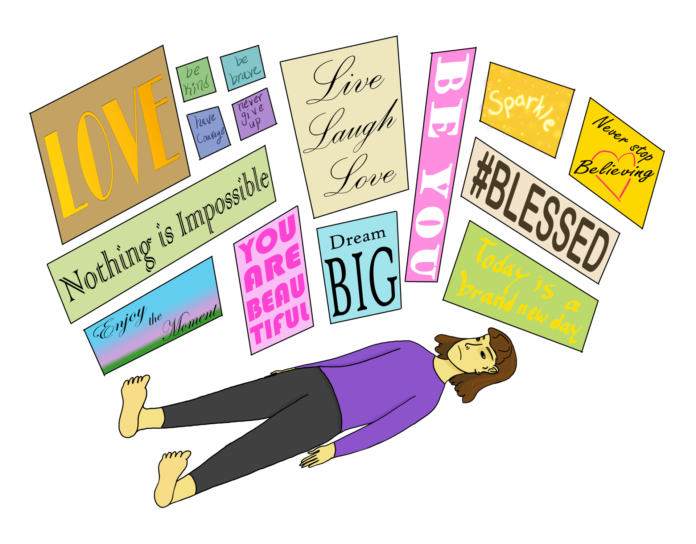Sarah Renard
Staff Writer
Social media platforms are full of accounts trying to spread positivity by encouraging others and lifting their spirits with motivational quotes and mantras. Encouraging as they may be, these accounts can unconsciously lead people to engage in what is called “toxic positivity.”
Toxic positivity refers to the idea of focusing on the positive and rejecting, or dismissing, negative emotions or anything that may bring negativity into your life. However, sometimes negative emotions are a necessary part of positive growth. Take the phrase “Think Positive, Be Positive,” or “ Be strong, things will get better.” One might find reassurance in such quotes. What one might not know, however, is that these quotes can be considered toxic positivity.
Motivational Instagram and Twitter accounts have the right idea; they are doing what they can to spread encouragement and positivity to those who may be struggling, and to a certain extent, it can work. But is it sustainable? Will these mantras help individuals in the long run?
Firstly, living by these mantras is much easier said than done. One can read “Live, Laugh, Love,” and still find that they need more substantive advice than a simple positive message can give. People might like a post because they find it relatable, or they agree with it, but that doesn’t necessarily mean that it brought them the peace they were looking for.
While such encouragement needs to exist, staying positive all the time isn’t a long-term solution, nor is it sustainable. It is essential for a person to get the help they need when they need it, whether it be talking with a friend or a therapist.
These mantras often provide people with short-lived encouragement, which isn’t enough to truly fix the issue. Just as Tylenol removes pain temporarily, the positive mantras provide a temporary fix to our negative emotions.
These accounts are trying to do a great thing; however, these quotes and mantras aren’t substitutes for therapy and practical life advice. Constant positivity may only mask a person’s true feelings and hinder their recovery. Researchers have found that over time, suppressing our negative feelings puts more emotional weight on ourselves than when we accept them. Depression, anxiety, stress, or any other mental health issue shouldn’t be taken lightly; it is important that one has access to resources that can help them deal with it effectively.
As students, it is important to prioritize health and wellness, and take the necessary steps to address mental health issues in order to succeed personally and academically. Don’t be afraid to ask for help when you need it, especially with something as important as mental health.
Campus Resources:
Counseling and Psychological Services (CAPS)
805-893-4411 (avail. 24/7) Building 599
Student Mental Health Coordination Services
805-893-3030
Social Work Services
805-893-3087











